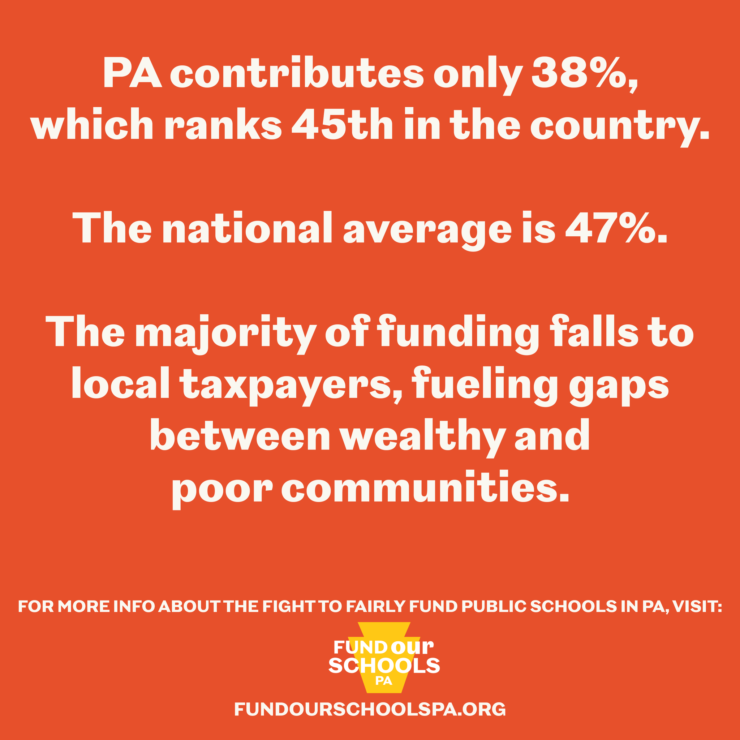
January 22, 2022 — Throughout this trial, the court has heard testimony from school leaders and teachers on the ground in low-wealth districts, who see the effects of Pennsylvania’s school funding system first-hand.
This week, the court was given a birds-eye overview of education funding from two leading economists. They discussed two questions at the heart of this case: why money matters for public education, and how investments in education pay off.
Daily summaries of each day’s proceedings are now available at FundOurSchoolsPA.org/news
Sign up to receive these weekly summaries in your inbox at FundOurSchoolsPA.org
The court also heard from Pennsylvania Secretary of Education Noe Ortega, one of the state officials sued in this case.
In Pennsylvania’s high school graduating class of 2011, Ortega said, just 20% of Black students and 21% of Hispanic students earned a degree within six years–less than half the 46% rate of their white peers. Similar gaps exist for economically disadvantaged students. Additional funding, Ortega said, would allow Pennsylvania to close those gaps in college attainment.
According to economist Clive Belfield, Pennsylvania is missing out on billions of dollars by failing to invest the needed resources to eliminate those gaps. Using research on the positive effects of education on wages, health outcomes, and much more, he calculated that Pennsylvania could gain a total social benefit of $18.5 billion if, for just one graduating class of students, low-income students earned college degrees at the same rate as their peers.
“Pennsylvania is looking at a series of high-yield investments and is not making those investments. That, by economic definition, is inefficient,” Belfield said.
Professor Belfield was followed on the stand by another economist, Dr. Rucker Johnson, a leading researcher on the impact of school funding on student achievement and life outcomes. The conclusion of his research is clear: Money matters.
“What we see is that the evolution of the achievement gap is not something that’s like in some kind of cement,” he said, “that can’t be alleviated because there’s some family background disadvantage.”
Johnson reviewed a comprehensive body of research, including a major study he conducted on school funding reforms in 28 states. Across the board, these studies showed that sustained, substantial investment in public education, targeted to the students with the greatest needs, has significant positive impacts and significantly narrows achievement gaps. Pennsylvania, he notes, has not made these investments, and its poorest districts have far fewer resources for their students. Chalkbeat Philadelphia covered his testimony.
The court also heard from Gregg Zeff, an attorney and legal redress chair for the NAACP-Pennsylvania State Conference, one of the petitioners in the case. The NAACP has 46 chapters across Pennsylvania and around 24,000 members.
Next week, school districts and parents will draw their case to a close, calling their last four witnesses to the stand. Among them are the superintendent and a recent graduate from Wilkes-Barre Area School District in northeastern Pennsylvania, one of the districts suing the state.
Trial is expected to continue well into February as legislative leaders put on their case defending the current school funding system. You can follow the court’s livestream of the trial at FundOurSchoolsPA.org/trial.
“I’m not saying that there aren’t some students overcoming the odds. I’m not saying that there’s not a lot of students that are resilient. I’m saying the support that they’re getting from the state’s funding formula and system is systematically making the odds of that success steeper, more difficult and unfair on equity grounds.” – Professor Rucker Johnson on Pennsylvania’s current, regressive school funding system.
Our Daily Summaries and Blog Posts
- ‘School Resource Equity Is An Essential Investment:’ Economist Rucker Johnson On Why Money Matters, Jan 21 (Friday)
- Big Benefits From Education Investments: Economists Testify, Jan. 20 (Thursday)
- Exploring The Economic Impact Of Education, January 19 (Wednesday)
- Noe Ortega, PA’s Secretary Of Education, Highlights Higher Education Disparities, Jan. 18 (Tuesday)
News Coverage
- Pennsylvania doesn’t spend enough on schools, state education secretary testifies — Chalkbeat Philadelphia, January 18, 2022
- State school funding trial could continue ‘well into February’ — The Confluence, January 20, 2022
- PA Fair Funding Trial: State Is Falling Short In Post-Secondary Attainment — Erie News Now, January 20, 2022
- Editorial: Fair funding trial shows the tale of haves and have-nots — Lansdale Reporter, January 16, 2022
